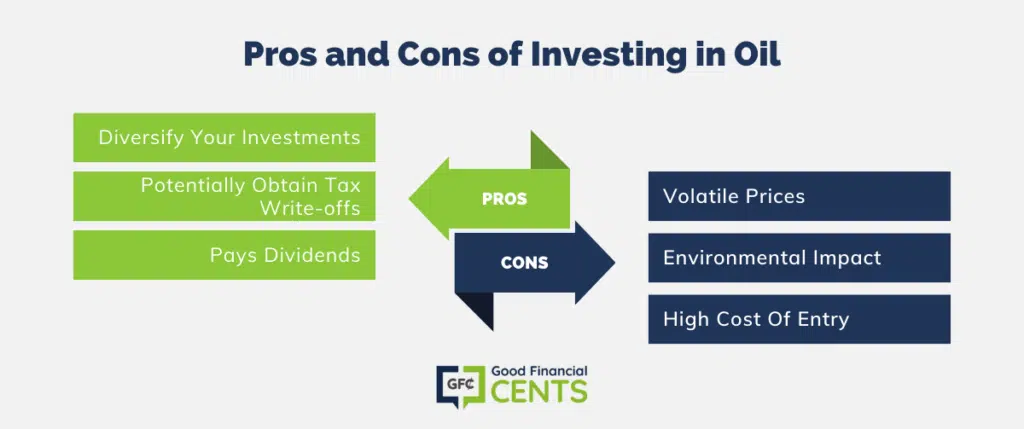Investing in oil can have a major financial upside, which is why it’s a popular choice for many investors. But, it’s not without its risk, as the process can not only be complex but oil prices are prone to some volatility.
If you want to invest in oil, it’s important to do your research and find a method of investing that matches your risk tolerance. Here’s what to know about investing in oil and how to decide if this is the right investment vehicle for you.
Table of Contents
What Is the Oil Market?
The oil market carries a rich history, intertwined with geopolitical and economic fluctuations. Oil, as a predominant energy source, has fueled global industries, influencing economic cycles. Its market landscape is painted with periods of booms, busts, and groundbreaking innovations, reflective of technological advancements and global demand shifts.
Investors eyeing the oil sector must navigate its volatility, often swayed by political decisions, environmental considerations, and technological disruptions. The understanding of the oil market’s historical background, punctuated by OPEC’s strategies, market speculations, and environmental regulations, remains crucial for informed investment strategies, facilitating meaningful participation in its diverse investment avenues.
Why Invest in Oil?
Oil can be a volatile stock which is one of its disadvantages that scares some investors off. However, it has many upsides, too.
Oil allows you to diversify your portfolio, which is highly recommended when creating a long-term investment strategy. Many oil stocks also pay dividends. For example, in the current quarter of 2023, Chevron stock yielded a dividend of $4.14 per share.
Then, there’s the potential for tax write-offs. Oil investments present unique tax advantages in the United States. Through tax exemptions and offsets, oil investors can avoid taxes they’d otherwise have to pay if they invested in alternative industries.
Despite this, oil isn’t the right investment for everyone. The volatile prices, high risk, environmental impact, and relatively high financial barrier to entry are some drawbacks to consider before jumping into an oil investment.

Factors to Consider Before Investing
Investing in oil is a multifaceted decision that requires thoughtful consideration of various factors.
- Volatility Awareness: Understand that oil prices are highly volatile and can significantly affect the potential returns on investments.
- Diversification: Consider diversifying investment strategies. Options include Master Limited Partnerships (MLPs), Exchange-Traded Funds (ETFs), Oil Futures, Direct Participation Programs (DPPs), and mutual funds related to oil or natural resources.
- Tax Advantages: Explore and utilize the unique tax benefits that often accompany oil investments, such as exemptions and offsets.
- Risk Tolerance: Carefully evaluate personal risk tolerance levels, ensuring that the selected investment method aligns with individual financial objectives and capabilities.
- Market and Geopolitical Analysis: Continuously monitor market trends, global events, and geopolitical shifts that might impact the oil industry and consequently, investment decisions.
- Environmental Considerations: Weigh the ecological impacts of investing in oil, as these factors can influence long-term investment sustainability and market perceptions.
How to Invest in Oil
There are several ways to get started investing in oil. When you’re evaluating your options, be sure to assess the risk level of each, to make sure it matches your own risk tolerance. Also, if you have any specific tax needs you’ll want to consider the tax advantages of certain investments and whether these can benefit you.
Master Limited Partnerships (MLPs)
MLPs, which are most often found in the energy industry, are entities that will typically provide or oversee the supplies, materials, or staff needed for other businesses in the energy industry to operate.
Think of companies that provide services to the oilfield, transport pipelines, or help oil companies coordinate their operations. They’re structured as partnerships, not corporations, for tax purposes. This means they pay tax at what’s often a much lower rate.
MLPs are relatively low-risk, making them a popular choice for those who take a long-term approach to investing, or for estate planning purposes.
Exchange-Traded Funds (ETFs)
Want to diversify your portfolio by adding oil, but aren’t prepared to buy oil itself? ETFs offer an alternative, and potentially less costly, method to integrate oil into your investment strategy. Since ETFs are essentially pre-packaged, you don’t have to make multiple purchases in oil stocks to round out your oil exposure.
You can trade ETFs just like you would any stock in your portfolio, so you don’t need a broker-dealer to help. This gives you greater control and makes overseeing your own portfolio easier. Plus, with oil ETFs, you don’t incur capital gains tax until the fund is sold.
Think you want to add oil ETFs to your portfolio? Conduct thorough research first by paying attention to the price of oil. Target specific ETFs and note their behavior as oil rises and falls. When you have an understanding of how each ETF you’re looking at reacts to marketplace changes, you can make your oil purchase based on your projections.
Oil Futures
Oil futures might be a good fit if you want an investment that’s more directly in line with the crude oil market. Futures are a type of financial contract that stipulates a transaction will take place at a set time, and date and for a certain price. You can buy futures in many industries, including oil. When it comes to crude oil futures, the contracts specify how much crude oil will be sold on a certain date and at what price.
Futures contracts cover 1,000 barrels at a time. When you take part in purchasing futures, it’s not expected that you’re going to one day be the owner of a barrel of oil. You purchase futures through a commodities exchange, selling before the expiration date on the contract.
Even a small change in oil prices can have a relatively big impact on your payout — if oil is at $45 a barrel and rises to $46 when you sell, that’s a $1,000 increase for just one futures contract.
Keep in mind, that you’ll need a margins account to trade futures. Usually, your margin account needs a minimum balance so that you can pay any losses you might incur at the close of the contract.
Direct Participation Program (DPP)
If you want to make a direct investment into activities like the exploration of oil you might want to consider a Direct Participation Program. These are long-term, pooled investments that rely on passive management, meaning they aren’t traded.
With a DPP, all of the members contribute their funds to be invested by the general partner. Whereas funding an exploratory drilling program might otherwise be only available to wealthy individuals, participating in a DPP lets investors — who otherwise wouldn’t have access to a lot of capital — participate with full exposure to the risk or reward.
In oil, there are several types of DPPs:
- Exploratory drilling program
- Developmental drilling program
- Working interest program
- Rework program
Since DPPs are often incorporated as partnerships they enjoy tax benefits over corporations. However, DPPs aren’t publicly traded. This means you can’t simply purchase a position in one like you would when buying a stock.
You might also have to meet a certain income level or have a certain amount of assets to invest. Depending on the state, you might even need to be an accredited investor to participate in a DPP. This is because DPPs are not a liquid investment. Once you invest your money in a DPP, you’ll need to be prepared to leave it there for five to 10 years.
Mutual Funds
Mutual funds take investments from many investors and use the collective total to secure assets, like stocks and bonds, related to the theme of the fund. They’re managed by professional mutual fund managers who research the market, and then either aggressively try to beat it or make safe investments that keep pace with the overall market.
Although it can be hard to diversify your portfolio by yourself, especially if you have limited money to work with, participating in a mutual fund can help you achieve diversification.
When it comes to oil, there aren’t specific oil mutual funds to invest in. Investors typically participate in mutual funds related to oil, such as energy funds or natural resource funds. By choosing the most appropriate funds in these industries, you’ll get some exposure to oil.
Monitoring and Adjusting Your Oil Investments
To maximize returns and mitigate risks in the oil sector, active investment monitoring and timely adjustments are crucial. With the industry’s inherent volatility, it’s vital to stay updated on global events, geopolitical tensions, and technological advancements that influence oil prices. Regularly review the performance of your selected investment vehicles, be it MLPs, ETFs, or DPPs.
This way, you can reallocate assets or diversify further, ensuring alignment with your financial goals and risk appetite. Additionally, consult financial advisors to gain insights into market projections. Remember, proactive management can transform potential pitfalls into profit-making opportunities in the ever-evolving oil market.
The Bottom Line: Investing in Oil
Investing in oil requires careful consideration of its volatility and a well-researched approach. Options include MLPs, ETFs, Futures, DPPs, and Mutual Funds, each offering unique risks and benefits. Essential factors include market awareness, geopolitical analysis, and an understanding of environmental impacts.
Continuous monitoring and strategic adjustments are crucial for navigating the dynamic oil market, maximizing returns, and aligning investments with individual financial objectives and risk tolerance. Remember to consider tax advantages and diversification benefits to make informed and profitable investment decisions.








